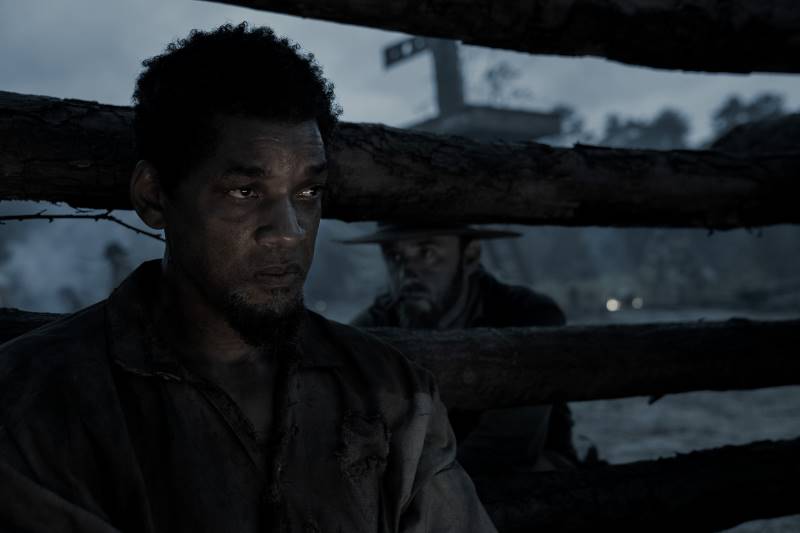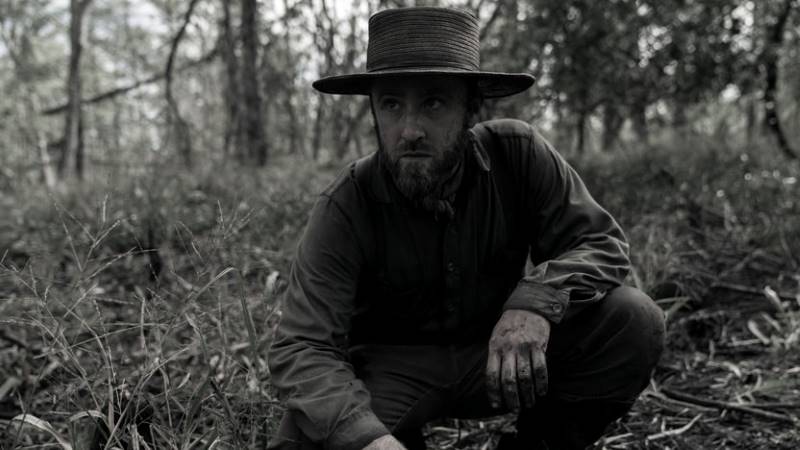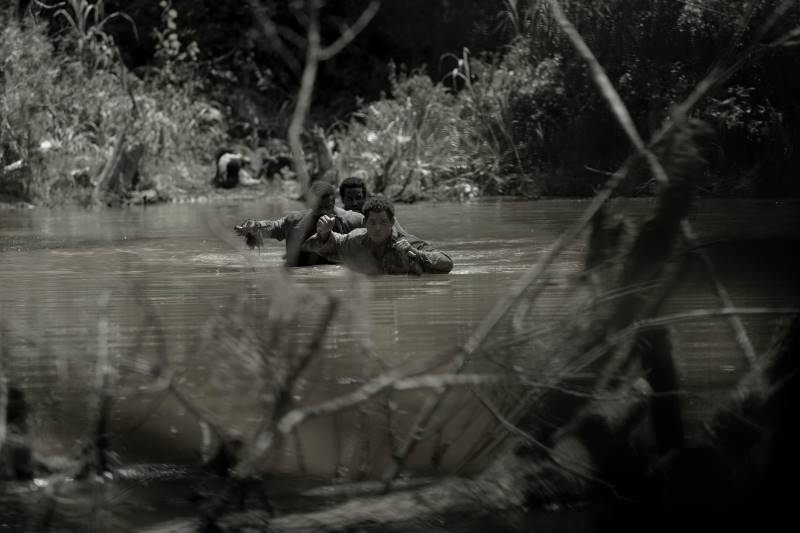If movies about America’s shameful history of slavery tend to be dramas, then Antoine Fuqua – best known for high octane thrillers like Training Day, The Equalizer and The Magnificent Seven – then Emancipation plays more like a chase film, as Will Smith’s Peter, a slave, goes on the run after escaping his captors.
Filmed on location last year in the treacherous swamps of Louisiana, the complicated US$120 million shoot involved scenes with horses, snakes, dogs and alligators, while production was beset by COVID, a hurricane and a tornado.
Fuqua allowed himself a pat on the back, having survived the whole thing, busy in postproduction when he was dealt the toughest blow of all. His star, the usually likable Will Smith, slapped comedian Chris Rock across the face on the stage of the Oscars in front of a stunned audience of millions around the world, before going on to collect the lead actor award for King Richard.
The fate of Emancipation – co-starring Australia’s own Charmaine Bingwa and Ben Foster – was swirled in uncertainty before Apple TV+ announced it would go ahead with the film’s release just in time for award season.
Inspired by the true story of the man known to historians as “whipped Peter,” owing to a sepia photograph taken in 1863 showing his bare back mutilated and criss-crossed with scars from repeated lashings. First published in Harper’s Weekly, one image, known as “The Scourged Back,” ultimately contributed to growing public opposition to slavery.
Emancipation begins as Peter is torn from his loved ones and transported to a Confederate labour camp to build a railroad. Confronted with staggering brutality, then buoyed by rumours that President Lincoln has ended slavery, Peter decides to make a break for it. His aim is to make it all the way to Union forces in Baton Rouge and to be reunited with his wife Dodienne (Bingwa) and their three children.
With Foster’s ruthless bounty hunter Jim Fassell tracking his every move, hounds on his heels, alligators in the maze-like bayou, and hazards of war raging all around, the odds could not be more against him. He has no weapons, no food, no map. All Peter has on his side is an immense spirit of grit, along with a profound internal faith, and the conviction of his own humanity.
“I never wanted to make a period film about slavery,” acknowledges Smith, 54. “I’ve avoided those roles my whole career. But the design and structure of Emancipation is that of a modern action thriller, which is not what anyone thinks of as films set in this period. Antoine and I both wanted to create a movie about a man empowered by a mindset of freedom, faith, love, and believing you can be invincible.”

Smith’s initial excitement, which propelled the film’s development, gave way to a tireless intensity on set. Through nearly every frame of the film, Peter is under extreme pressure and tested on every level, confronted equally by the indifference of wild nature and the remorselessness of humans at their worst, yet he uses this to stoke his faith and resolve further.
“Without question, this was the hardest film of my career,” says Smith. “It was searing hot, a hurricane tore down our sets, I was in the swamp every day. But when you’re telling a true story like this, there’s a huge energy you get from the meaningful purpose of sharing an incredible human life with others.”
For Fuqua, too, he was excited to give audiences a fresh perspective on slavery, envisioning the film joining the pantheon of breakneck chase movies fuelled by defiance, from The Great Escape to Mad Max: Fury Road.
“I’ve long wanted to tell a story about the inhumanity of slavery,” says Fuqua. “But what excited me is that Emancipation is also a beautiful love story about our people and it’s a story of triumph. I wanted audiences to see the truth but then to walk away inspired.
“Right from the beginning, I was passionate about seeing Will do this. Part of that is because in 1863, the concept of someone like Will, who’s so loved, would have been enslaved. And then as we developed Peter, it broke my heart, and I felt like this had to be done. That’s important today where it feels like we’re forgetting our past, which is dangerous. I felt that it was time and, as I watched George Floyd murdered on the street, I was even more fueled. It’s important to tell these stories now,” he adds.

For Foster, playing the ruthless bounty hunter was not a role he took on lightly. “Fassell was something that I initially didn’t want to do. I come from a civil rights activist family. My grandfather, my father, my Nana marched with Martin Luther King, a month after Selma. I wanted nothing to do with this film, because it scared me. And I didn’t want to think about these things.
“And having come off the film, The Survivor, in which I played a man who escapes concentration camp, I didn’t want to look at this part of America. And in that not wanting to reflect, I realised that that was the best way to continue on in my own way to consider, how do we get here? Why are we here today?
“So, how did I prepare for this? It was asking a lot of questions with Antoine; nervy questions as a white man about where does white fear come from, and the resulting violence that occurs and how can we stop this chain?
“But I do love human beings. I do believe that we can always do a little bit better, even if something horrible has happened. I believe in mankind, I’m hopeful for mankind,” he says.

Cast as Peter’s wife Dodienne, Bingwa brings a passion and sense of endurance to her role, despite not having the luxury of chemistry testing with Smith beforehand. “Will’s a busy guy. But I feel like I had the easier job in connecting with him because, you know, he’s very google-able,” says the Zimbabwean/Australian actress who won the 2018 Heath Ledger Scholarship, enabling her to move to Hollywood where she won a lead role on popular TV series, The Good Fight.
“I think Will and I have similar personalities, and we both wanted to make sure that our characters had a great love; a love that was elevated and, especially given what our characters go through, a love that, whether it was in this life or the next, that they knew that they would be together, so it had to carry even in the scenes that we weren’t in together,” she says.
While Smith does not directly address “The Slap” during our interview, he remains clearly contrite, trying to replace the anger of that moment – when he perceived Chris Rock as insulting his wife Jada Pinkett Smith – with a message of love.

“My life is devoted to creating things that will add, hopefully, to the human transition to love as the new operating system,” he says. “All films, all art can be meaningful, anything can be meaningful. It’s just what you centre it on. I won’t make a film if I don’t believe there’s something in the character or the story that adds to the human conversation of how we can figure out how to be more kind and harmonious with one another.
“The concept of emancipation and the concept of freedom that I learned from Peter, is that it is an internal idea. Peter’s body was enslaved, but his mind was always free. He was a spiritual warrior, who had learned in the face of all things, to never doubt God; to never lose the centering power of his faith and his love. And he believed that as long as he sustained his trust and surrendered to God, that God would keep His promise of delivering Peter to salvation, delivering to his family, delivering him to ultimate wisdom, ultimate love, ultimate happiness.
“And that concept of being unwavering in your emotional and spiritual independence, to me, is true emancipation,” he says.
Emancipation is streaming now on Apple TV+